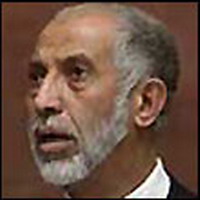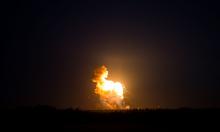Deadly bombings make Algerian step up patrols
The bombing attacks claimed by al-Qaida in Algeria killed 24 people and injured 222 and made Algerian police strengthen control over capital and establish highway checkpoints.

Wednesday's bombings lent credence to fears that al-Qaida's new wing in North Africa is coalescing into a deadly, possibly region-wide, threat.
The reinforced surveillance was reminiscent of the height of Algeria's Islamic insurgency in the 1990s. Authorities said the death toll from the car bombings of the prime minister's office and a police station could rise. Western countries reduced embassy services and urged their citizens to avoid traveling on predictable routes.
The group that claimed responsibility, al-Qaida in Islamic North Africa, was built on the foundations of a decade-old Algerian insurgency group fighting the nation's secular government.
The new al-Qaida wing has carried out a series of recent bombings jeopardizing Algeria's tentative peace. The country, a staunch U.S. ally in the war against terror, has been trying to recover from the 15-year insurgency, which killed 200,000 people.
Algeria's neighbors have felt an increase in terror activity. Courts in Tunisia, to the east, in recent months convicted at least two dozen suspects on terrorism-related charges - many said to be linked to the Algeria-based network. In January, at least 14 people were killed in Tunisia in clashes between Islamist extremists and security forces.
In Morocco, to the west, three suspected terrorists blew themselves up and a fourth was shot and killed in a police raid on Tuesday in Casablanca, the country's largest city.
Moroccan Interior Minister Chakib Benmoussa said Wednesday that investigators have not established links between the Casablanca violence and that in Algeria, but "we don't rule it out."
Until recently, Algeria's peace efforts seemed successful: Military crackdowns and amnesty offers had turned militants into a ragtag assembly of fighters in rural hideouts.
But late last year, the main Algerian militant group, the Salafist Group for Call and Combat, known by the French abbreviation GSPC, changed its name to al-Qaida in Islamic North Africa and began targeting foreigners - signs the dwindling ranks of Islamic fighters were regrouping.
Wednesday's attacks were the deadliest to hit the Algiers region since 2002, when a bomb in a market in a suburb killed 38 people and injured 80. The targeting of the premier's office was among the most brazen in Algerian history.
Al-Qaida and its regional arms or affiliates have not carried out such a deadly attack in non-insurgency areas since Nov. 9, 2005, hotel bombings in Amman, Jordan, said Ben Venzke, head of the IntelCenter, a U.S. government contractor that monitors al-Qaida messaging. The biggest last year were April 24 suicide bombings in Dahab, Egypt, which killed 23.
The date of Wednesday's attacks, April 11, could be symbolic: Attacks on the 11th day of the month are a hallmark of al-Qaida and its admirers.
Algerian Prime Minister Abdelaziz Belkhadem, who was not in his office during the attack, called the bombings a "cowardly, criminal terrorist act." Parts of six floors of the building housing his office and those of the Interior Minstry were ripped away, and iron gates outside were bent by the blast.
The government did not name suspects. Al-Jazeera television reported receiving a call from a spokesman for al-Qaida's North Africa wing saying three suicide bombers in vehicles packed with explosives carried out the attacks.
Witnesses said they saw a red car drive toward the prime minister's office, that police opened fire to try to stop it, and that the car exploded.
Fayza Kebdi, a lawyer who works opposite, said the explosion blew her husband across the room.
"We thought the years of terrorism were over," she said. "We thought that everything was back to normal. But now, the fear is coming back."
Civil defense officials reported at least 12 people and 135 injured in the government building. And 12 others were killed and 87 wounded in the attack on the police station, which is on the road to Algiers' airport.
Of the wounded, 57 were kept in hospitals Wednesday night, while the rest were treated and released, the Interior Ministry said.
Subscribe to Pravda.Ru Telegram channel, Facebook, RSS!





